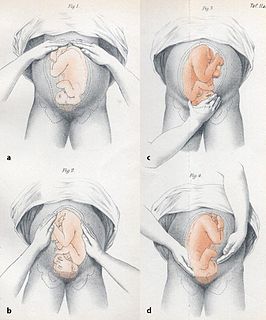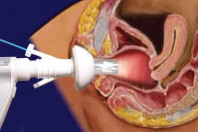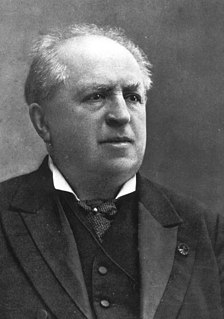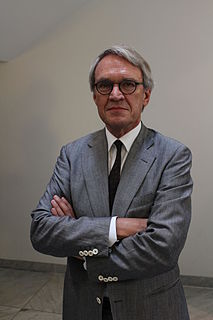
Obstetrics and gynaecology or obstetrics and gynecology is the medical specialty that encompasses the two subspecialties of obstetrics and gynecology. It is commonly abbreviated as OB-GYN or OB/GYN in US English and Canadian English, and as obs and gynae or O&G in British English.

Gynaecology or gynecology is the medical practice dealing with the health of the female reproductive system. Almost all modern gynaecologists are also obstetricians. In many areas, the specialities of gynaecology and obstetrics overlap.

Abraham Kuyper, "with a 'y', not an 'ij'", was the Prime Minister of the Netherlands between 1901 and 1905, an influential neo-Calvinist theologian and a journalist. He established the Reformed Churches in the Netherlands, which upon its foundation became the second largest Calvinist denomination in the country behind the state-supported Dutch Reformed Church.

The University of Amsterdam is a public research university located in Amsterdam, Netherlands. The UvA is one of two large, publicly funded research universities in the city, the other being the Vrije Universiteit Amsterdam (VU). Established in 1632 by municipal authorities and later renamed for the city of Amsterdam, the University of Amsterdam is the third-oldest university in the Netherlands. It is one of the largest research universities in Europe with 31,186 students, 4,794 staff, 1,340 PhD students and an annual budget of €600 million. It is the largest university in the Netherlands by enrollment. The main campus is located in central Amsterdam, with a few faculties located in adjacent boroughs. The university is organised into seven faculties: Humanities, Social and Behavioural Sciences, Economics and Business, Science, Law, Medicine, Dentistry.

Naguib Pasha Mahfouz is known as the father of obstetrics and gynaecology in Egypt and was a pioneer in obstetric fistula.

Aletta Henriëtte Jacobs was a Dutch physician and women's suffrage activist. As the first woman officially to attend a Dutch university, she became one of the first female physicians in the Netherlands. In 1882, she founded the world's first birth control clinic and was a leader in both the Dutch and international women's movements. She led campaigns aimed at deregulating prostitution, improving women's working conditions, promoting peace and calling for women's right to vote.

Abraham Jacob van der Aa was a Dutch writer best known for his dictionaries, one of notable people and the other of notable places in the Netherlands.

Floris Adriaan van Hall, Baron of Hall was a prominent Dutch nobleman and statesman in the 19th century. He played an important role as representative of the Amsterdam trade and banking sector, and later as politician. He served as Prime Minister of the Netherlands from 1853 to 1856, and again from 1860 to 1861.
Aron Mendes Chumaceiro was chakam (rabbi) of Curaçao, Dutch West Indies. He received the various rabbinical degrees at the celebrated bet ha-midrash Ets Haim. In 1848 he was awarded the royal gold medal for the best sermon in the Dutch language. When the Sephardic synagogue of Amsterdam proposed to elect him preacher in the vernacular, it met with strenuous opposition, Ladino being the only language, except Hebrew, used in the synagogue. When in 1852 Chumaceiro was elected first ab bet din, he succeeded in overcoming the opposition to Dutch, and soon established a reputation as one of the foremost pulpit orators in the Netherlands. In 1852 he edited the first Dutch Jewish weekly, Het Israelietisch Weekblad. In the same year he was elected head of the bet ha-midrash Ets Haim.

Adriaan Valckenier was Governor-General of the Dutch East Indies from 1737 to 1741. Mainly remembered for his involvement in the 1740 Batavia massacre, Valckenier later died in a prison in Batavia.

Louis de Lotbinière-Harwood (1866–1934) F.A.C.S., was a Canadian gynaecologist. He was Dean of Medicine at Université de Montréal, the second campus of Université Laval. He was President of the Medical Union of Canada, President of the Hôpital Notre-Dame and President of the Radium Institute, Paris. His reputation as an educator and a surgeon extended throughout North America and Europe, recognised through his creation as an Officier de Le Légion d'honneur in France. He has been referred to as the 'Father of Canadian Gynaecology'.

Cornelia Scheffer was a Dutch painter and portrait miniaturist. She was known as "a woman of much energy and strength of character." She also "was distinguished by her talents, her wit, and many good qualities, which rendered her one of the remarkable women of her time." She is often thought of as the most visually commemorated artist’s mother of all time.
Sir Marcus Edward Setchell, is a leading British obstetrician and gynaecologist and the former Surgeon-Gynaecologist to Queen Elizabeth II's Royal Household.

Frank de Miranda was a Dutch sculptor, psychologist and publicist.
Richard Herbert Joseph Fetherston was an Australian doctor and politician.

William Francis Victor Bonney FRCP FRCS was a prominent British gynaecological surgeon. He was described by Geoffrey Chamberlain as "a primary influence on world gynaecology in the years between the wars".

George Harold Arthur Comyns Berkeley was an obstetric physician, gynaecological surgeon and medical writer. Berkeley was most notable along with William Blair-Bell and Sir William Sinclair for creating the British College of Obstetricians and Gynaecologists. Berkeley was also noted for his writing collaborations with Victor Bonney, the book A Textbook of Gynaecological Surgery that is still considered a medical classic. It was as teacher that he excelled.

Robert William Johnstone CBE, FRCSEd, FRSE, FRCOG, was a Scottish obstetrician and gynaecologist. For some 20 years he was Professor of Midwifery and Gynaecology at the University of Edinburgh. He was a founding Fellow and subsequently vice-president of the Royal College of Obstetricians and Gynaecologists. He served as president of the Royal College of Surgeons of Edinburgh from 1943 to 1945.

Cornelis Nicolaas Maria "Cees" Renckens is a Dutch Doctor of Medicine, gynaecologist, and a well-known skeptical activist against quackery. From 1988 to 2011, he was president of the Vereniging tegen de Kwakzalverij, which has been actively opposed to all non-science-based medicine since its foundation in 1881. Renckens has written several books about alternative medicine, pseudoscience and quackery.

Ruth Nicholson FRCOG was an English obstetrician and gynaecologist who served as a surgeon in the Scottish Women's Hospital at Royaumont, France during the First World War. For this work she was awarded the Croix de Guerre and the Médaille d’Honneur des Épidémies by the French government. After the war she specialised in obstetrics and gynaecology as Clinical Lecturer and Gynaecological Surgeon at the University of Liverpool with consultant appointments at Liverpool hospitals. She was a founder member of the Royal College of Obstetricians and Gynaecologists in 1929, being elevated to fellow of the college in 1931.

















